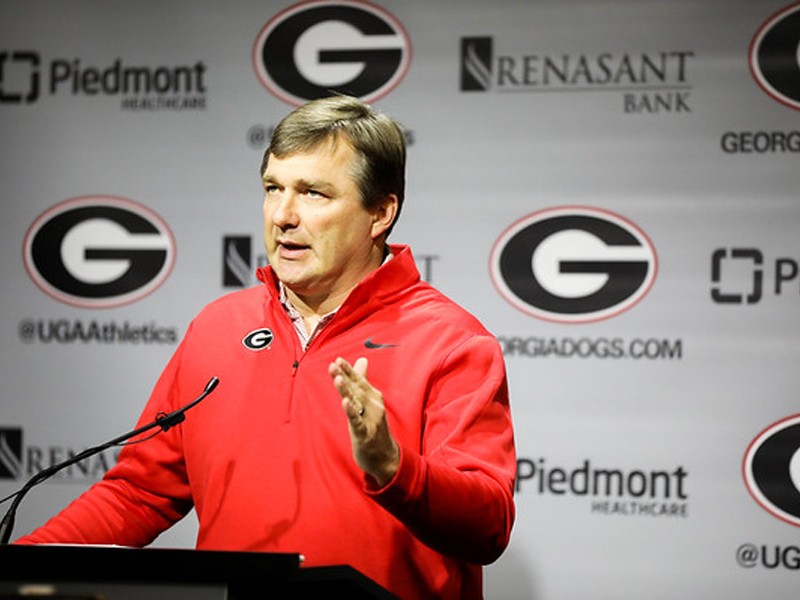Georgia and the rest of the SEC will be allowed to bring athletes back in all sports to campus for voluntary activities starting June 8 at the discretion of each university, and the Big 12 plans to welcome football players back to campus a week later.
“We’re excited to now know when players can begin returning to campus," Georgia football coach Kirby Smart said. "We’ll be coordinating our efforts with the medical staff keeping the primary focus on health and safety of our student-athletes and those working directly with them during this time. We’ll be working in the coming days on finalizing plans to implement the return of our players. I’m sure they are looking forward to returning and begin working toward what we hope is a regular season in the Fall.”
The Friday announcements are the latest signs that a college football season will be launched in some form this fall. Other conferences are expected to follow, though decisions could be left to individual schools.
The move comes two days after the NCAA Division I Council voted to lift a moratorium on voluntary workouts on campus by football and basketball players, effective June 1. The NCAA updated that ruling Friday by saying voluntary activities would be allowed in all sports starting June 1.
“At this time, we are preparing to begin the fall sports season as currently scheduled, and this limited resumption of voluntary athletic activities on June 8 is an important initial step in that process,” SEC Commissioner Greg Sankey said.
The SEC initially announced Friday that voluntary in-person activities could resume June 8 on SEC campuses only for football, men’s basketball and women’s basketball. But after the NCAA issued its updated ruling Friday afternoon, the SEC announced that June 8 date would apply to athletes in all sports.
“I’m sure everyone is pleased to now have direction from both the NCAA and the SEC on some parameters for bringing student-athletes back to campus in cooperation with the University System of Georgia," Georgia Athletics Director Greg McGarity said. "It’s only the first step and there are many details still to be determined on every campus. We’ll certainly be driven by the medical community and our sports medicine staff led by Ron Courson. Guidelines and enhanced health and safety measures will be followed to the letter. Again, this is only the first step with further details and plans coming over the next several days and weeks.”
Big 12 presidents and chancellors met Friday and decided voluntary activities could begin June 15 for football, July 1 for other fall sports and July 15 for all other sports.
SEC officials noted any workouts would take place “under strict supervision of designated university personnel and safety guidelines developed by each institution.” They referred to June 8 as the start of the “transition period that will allow student-athletes to gradually adapt to full training and sports activity after this recent period of inactivity.”
Permitted actions are limited by the NCAA to voluntary activities supervised by strength and conditioning personnel. Georgia athletic director Greg McGarity said it was “only the first step with further details and plans coming over the next several days and weeks.”
“This is an important first step toward having a season this fall, and we will continue to collectively work together as our top priority is to ensure the safety and well-being of our student-athletes, coaches and staff,” Auburn coach Gus Malzahn said in a statement.
The SEC decided to resume athletic activities with the guidance of a league task force that includes public health, infectious disease and sports medicine professionals from each of the league’s 14 member schools.
The task force prepared a series of best practices for screening, testing, monitoring, tracing, social distancing and maintaining clean environments to serve as a guide for each school.
Recommendations included testing of symptomatic team members (including athletes, coaches and staffers) as well as screening athletes before they arrive on campus within 72 hours of entering athletic facilities and on a daily basis once they resume athletic activities.
Other recommendations include immediate isolation of team members who are diagnosed with COVID-19 or are under investigation, followed by contact tracing under Centers for Disease Control and local public health guidelines.
“Health and safety have been our top priority as we’ve gone about this planning process, and we’ll continue to follow guidance from medical experts and health officials as we navigate the coming weeks,” Tennessee athletic director Phillip Fulmer said. “Our staff and student-athletes should be prepared for a ‘new normal,’ as we’ll be implementing changes to how everyone accesses and uses our facilities.”
SEC officials said the task force’s recommendations could provide a guide to league members, Sankey noted that each school would get to make its own decisions regarding plans for how to make sure student-athletes return safely.
For example, even though the task force’s recommendations only mentioned testing symptomatic team members, Georgia senior associate athletic director for sports medicine Ron Courson said in a statement that the Bulldogs “will conduct COVID testing and perform medical evaluations on all student-athletes.” Florida announced that it also would be testing all of its athletes.
Texas Gov. Greg Abbott said Friday he thinks college football will return on schedule with at least some spectators. Abbott has already issued new rules to allow youth sports leagues to resume in June and for some professional leagues to hold events without spectators.
“Once we get to college football season, our goal right now is to have college football season start as planned, with fans in stands,” Abbott said in an interview with Austin television station KXAN. “What we don’t know is what the capacity level would be.”
AP Sports Writers Jim Vertuno, Teresa M. Walker, Paul Newberry and John Zenor contributed to this report.









